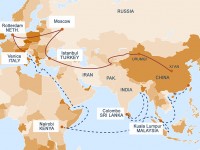
Fu Mengzi, VP, China Institutes of Contemporary Int'l Relations
Sep 05, 2016
As the international economic environment is rather complicated, B&R will involve enormous investments, long construction cycles and slow payback, with various risks and challenges. Many projects are well underway, however, from Indonesia to Central Asia, and more and more countries and regions are aligning with the B&R strategy and China’s commitment to mutual benefit.

Zhao Minghao, Professor, Institute of International Studies at Fudan University, and China Forum Expert
Sep 02, 2016
The world’s two largest economies must lead globalization onto a track of fast progress, to further accentuate “development”, placing more emphasis on “the politics of distribution”, rather than on “the politics of production”.

Eric Harwit, Professor, University of Hawaii Asian Studies Program
Aug 31, 2016
A key federal committee has just blessed what would be the largest-ever Chinese overseas investment, the $43 billion takeover of the giant farm pesticide and seed corporation, Syngenta. In doing so, the U.S. government is showing acquiescence when issues of national security or key resources are off the table. However, it may also be taking a risk with American food safety.

Wang Yusheng, Executive Director, China Foundation for Int'l Studies
Aug 31, 2016
Chinese concepts and wisdom about “win-win cooperation”, “new type of major-country relationship”, “community of common destiny of all mankind” and “new security concept” will surely contribute to the G20 in the development of solidarity and a partnership spirit.
Niu Li, Director of Macro-economy Studies, State Information Center
Aug 31, 2016
China’s macro challenge: Stay problem-oriented and target-oriented, considerably alleviate the financing difficulty of the private enterprises, reduce excess capacity, foster a driving force for a new growth and stimulate private investment – all while speeding up supply-side structural reform.

Dan Steinbock, Founder, Difference Group
Aug 30, 2016
As China assumes G20 leadership, the prospect of global “protectionism” is on the rise and the stakes could not be higher for cooperation and major structural reforms. Without continued investment and trade, secular stagnation in advanced economies and growth deceleration in emerging economies will continue to broaden.
Yin Chengde, Research Fellow, China Foundation for International Studies
Aug 30, 2016
The US should follow the historical trend of trade liberalization, abandon protectionism, and engage in non-discriminatory free trade. That is the only winning formula for its own and the rest of the world’s economic difficulties.

Aug 25, 2016
The US-China Business Council has released the key findings of its 2016 annual member survey. For the past 11 years, USCBC has polled its members on their business performance in China and their priority issues.
Fernando Menéndez, Economist and China-Latin America observer
Aug 25, 2016
Donald Trump’s nomination as the presumptive GOP candidate has come amid global alarm that the openly protectionist candidate will launch a series of anti-free trade initiatives if elected. However, a trade war with Mexico, and even more so with China, would have catastrophic consequences for the U.S. economy.
Zhang Monan, Deputy Director of Institute of American and European Studies, CCIEE
Aug 24, 2016
The tool of negative interest rates has not worked, but has spread to dangerous levels. If the current global crisis bailout methods are not fundamentally reformed, and the old policy options continue to be applied, the possibility of another global crisis in the future can not be ruled out.
Back to Top

- China-US Focus builds trust and understanding between the U.S. and China through open dialogue among thought leaders.
- Our Offerings
- Topics
- Videos
- Podcasts
- Columnists
- Research Reports
- Focus Digest
- Stay Connected
-
Thanks for signing up!
- Get the latest stories from China-US Focus weekly.